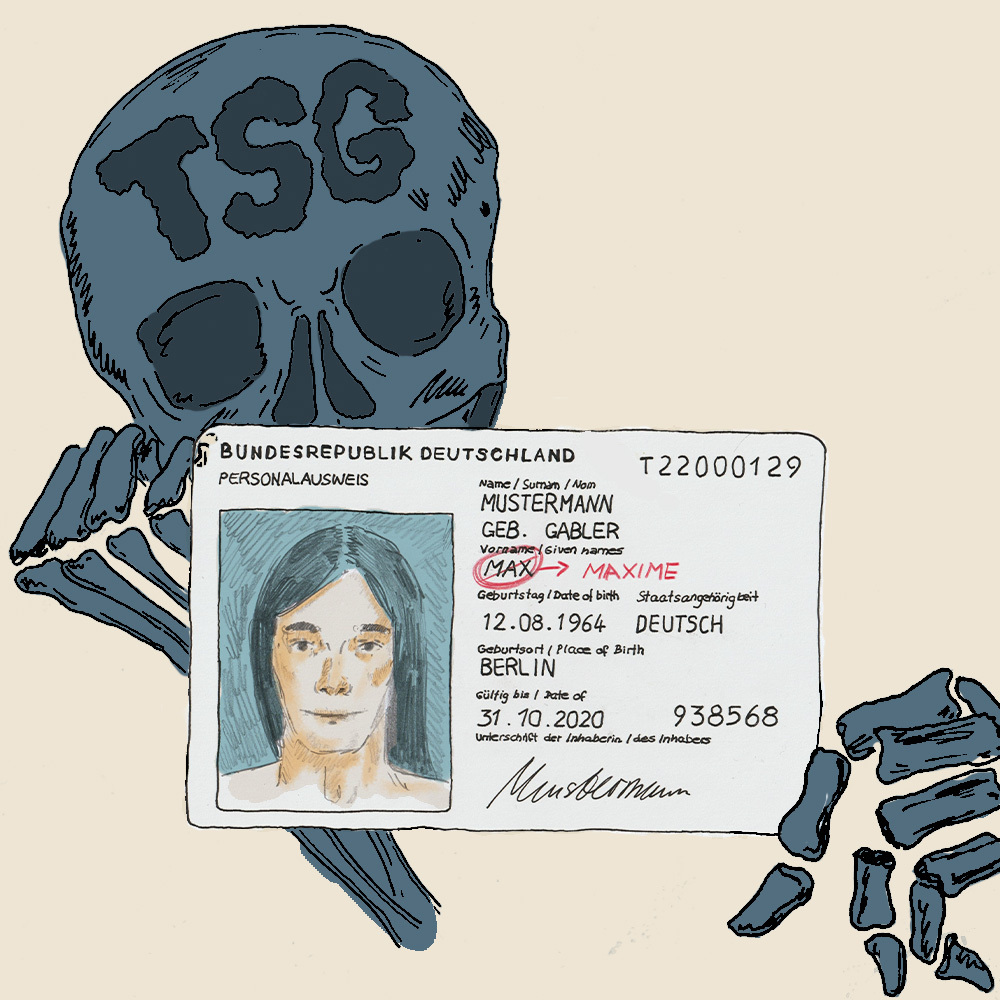When Will Legislation Change for Transgender People in Germany?
by Caelan Novo Fernandez
If transgender people want to change their gender designation and first name in Germany, they often have to go through an excruciating process, largely caused by the installation of the law they have to follow: The Transsexuals Act.

The Transsexuals Act – better known by the abbreviation TSG – was passed in 1980 and came into force the following year. This was more than 40 years ago. At the time it may have been revolutionary but nowadays, the legislation of the Transsexuals Act is considered a human rights violation. Despite all the criticism, the law is still in effect. However, with a new governing coalition, change may finally be in sight.
The purpose of the Transsexuals Act is to provide transgender people with an option to legally change their first names and gender designation. In order to make use of this law the applying person has to hand in two separate reports by experts, that conclude, that the applicant feels they belong to a different gender than the gender assigned at birth, the urge to live with this identity for at least three years and that this feeling will most likely not change again.
Changing one’s gender designation and first name by using the Transsexuals Act, however, is time-consuming and expensive. According to a study by the Federal Ministry of Family Affairs the average length of a procedure to get the first name and gender designation changed through the Transsexuals Act is nine months, while ranging from five to up to twenty months. The study also finds that the total cost of the procedure lies around 1,900 euros.
Not only does the current procedure cost more than some people can afford, transgender people experience a variety of discrimination in the process of getting their gender designation changed. In an interview with Zeit Online, Felicia Ewert, who has been through the process, comments: “I felt really fragile and at the mercy of others.” Ewert had to answer intimate questions about her past relationships and sex life, which have nothing to do with her gender identity. Other people report they were surveyed based on gender stereotypes, forced through humiliating physical examinations or had to participate in a paedophilia test.
The Transsexuals Act has been declared unconstitutional by the German Federal Constitutional Court several times – 2011 being the latest time a part of the law was sentenced inapplicable. The German Institute for Human Rights states, that the TSG-regulations are an interference with personal rights. And even a 2018 review of the United Nations Human Rights Council recommends reforms in favour of self-determination.
There have been multiple attempts to change the legislation by various parties before. The latest drafts being by the FDP and The Greens, which would replace the Transsexuals Act with a new law – A Self-Determination Act. The last debate on a change of legislation was held in May 2021. Even so, all previous attempts have been blocked by the late government coalition of CDU and SPD at the time.
After the federal elections in September 2021, however, a new government has formed. The coalition in power now consists of the SPD, The Greens and FDP. Not only are the two parties, who have brought forward drafts on reforms of the Transsexuals Act before, now in the acting government, their current coalition paper specifically states that they “will abolish the Transsexuals Act and replace it with a Self-Determination Act”. According to the paper, a future procedure to change one’s first name and gender designation would include a visit to the registry office that allows these changes to be made by self-disclosure.
Although this is a glimmer of hope for transgender people in Germany, these plans are still very unspecific. No drafts for such a Self-Determination Act have been brought forward by the coalition yet. It remains unclear whether the parties will hold up the promises of their election campaign. But if the coalition should suggest a change of legislation like this, passing this law would be realistic with the government having the needed majority in the Federal Parliament. The Federal Council of Germany, which takes part in German law-making, has urged the past government to change the legislation of the TSG in 2017 and expressed the significance of self-determination in changing one’s gender designation.
Taking all of these developments into account, there doesn’t seem to be a major obstacle stopping a change in legislation of the Transsexuals Act to happen. What it needs now, is action from the governing coalition. But with the ongoing Covid-19 pandemic and the surging war in Ukraine, changing the Transsexuals Act isn’t currently on the political agenda in Germany.
- S(pr)ay it loudGraue Wände werden zu Kunst, während bei nächtlichen Streifzügen das Adrenalin kickt. Graffiti ist für viele Sprayer*innen gelebte Subkultur, in der sich FLINTA* langsam aber sicher ihren rechtmäßigen Platz erkämpfen.
- Wie viel Schwammstadt steckt in Darmstadt?Wer in die Einsteinstraße im Darmstädter Stadtteil Bessungen einbiegt, fühlt sich wie in die Zukunft versetzt. Es ist wie eine Vision vom perfekten und nachhaltigen Wohnen. Sieht so eine verantwortungsvolle Politik aus? Wie positioniert sich Darmstadt im Kampf gegen den Klimawandel? Und welche Rolle spielt dabei das Konzept von Schwammstädten?
- Leben und Studieren mit Morbus CrohnAls ich aufwachte, schwamm ich noch im Nebel der Narkose. Alles war weich, wattig und entspannt. “Wie geht es Ihnen?”, drang eine Stimme zu mir vor, die ich dem Arzt zuordnen konnte. “Gut, noch ziemlich benebelt.”, brachte ich mit viel Mühe hervor. “Alles klar, dann kommen Sie doch einfach gleich ins Besprechungszimmer!”, flüsterte die Stimme des Arztes wie durch Watte in meine Richtung und er verließ den Raum. Kurze Zeit darauf bekam ich dann die Diagnose auf das, was mich seit 2 Jahren immer wieder lahmlegte: Morbus Crohn.



